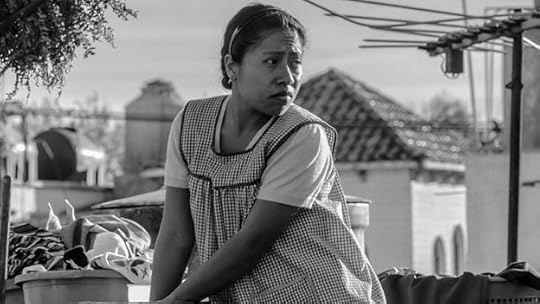The Best Thing I've Read about "Roma"

"Roma" exposes Mexico's darkest secret,
by Marcela Garcia in the Boston Globe
Such an excellent essay by Marcel Garcia. A number of people I've talked to may have liked this movie, but when we've talked about it in more depth, it's like we've seen two different films. That's always possible with a book or film, of course, but in this case, and at this particular time in history, I've found the dissonance quite disturbing.
It always bothers me that so many people think they already know all there is to know (or all they want to know) about the complex cultures south of the American border, when they actually know very little. I'm probably hyper-sensitive because I too was quite ignorant before I started going to Mexico and learning about it myself; I wasn't even sure I wanted to go, except that I knew there was a tradition of art that I wanted to see firsthand. Now I wonder how I could have been so limited. Where does this ignorance come from? Is it because we are inundated with media "information" and mass culture through Hollywood films and TV, and equate that with real knowledge? Is it because most people don't travel to Latin America beyond the resort beaches? Is it because so few of us form real friendships with people from different cultures, religions and ethnicities than ourselves, where we are willing to actually listen to and learn from the truth of their lived experience? Perhaps most people simply don't want to be stretched in this direction because it also requires looking at oneself.
I've now been to Mexico City for six extended periods of time, and have relationships with a number of Latin American friends. Yet with every visit and conversation, as with people from every culture different from mine, I realize how little I knew, and still know. Of course I've become uncomfortably aware of my own privilege, and ability to travel and come back to my far easier North American life. But it's a lot more than that. I want to be as open as possible when I see a film or read a book or talk to someone, as well as when I'm traveling, so that I am able to learn. I don't want to live in a North American bubble and take it with me everywhere I go. We all do that to some extent, but dropping it consciously seems to be more than most people want to do.
I also know firsthand how uncomfortable this process can be. I've been doing it for my entire adult life, partly because I married outside my culture, but also because of a longstanding desire for knowledge of otherness and for being stretched. I know everyone doesn't share this, or feel that the reward of growing wiser is worth the pain of feeling uncomfortable, hurt, misunderstood, or being in the minority, where we suddenly have to listen and accept different ways, and not be in a position of control or power. I get it. Most of us prefer to stay in our own tribe, however narrowly or broadly we define that. The world is moving in a different direction, though, and we can either accept that, understand our own privilege, and change -- or fight against it, which I see so-called liberals doing just as much as conservatives, when it involves actually confronting one's own stereotypes and sense of entitlement or superiority. It's one thing to oppose building a wall, or separating families, and entirely another to actually learn what is beyond that border, or who those families are, or our own complicity in the systems that have made them want to leave -- perhaps for a life of domestic servitude in America.
Roma confronts racism in Mexican culture, but it also asks us to look within. So I was grateful for Garcia's insights and explanations about her own culture, and the lens through which North America has viewed both Mexico and this particular film. I'm grateful she took the time to write this piece.
Published on February 28, 2019 07:42
No comments have been added yet.



